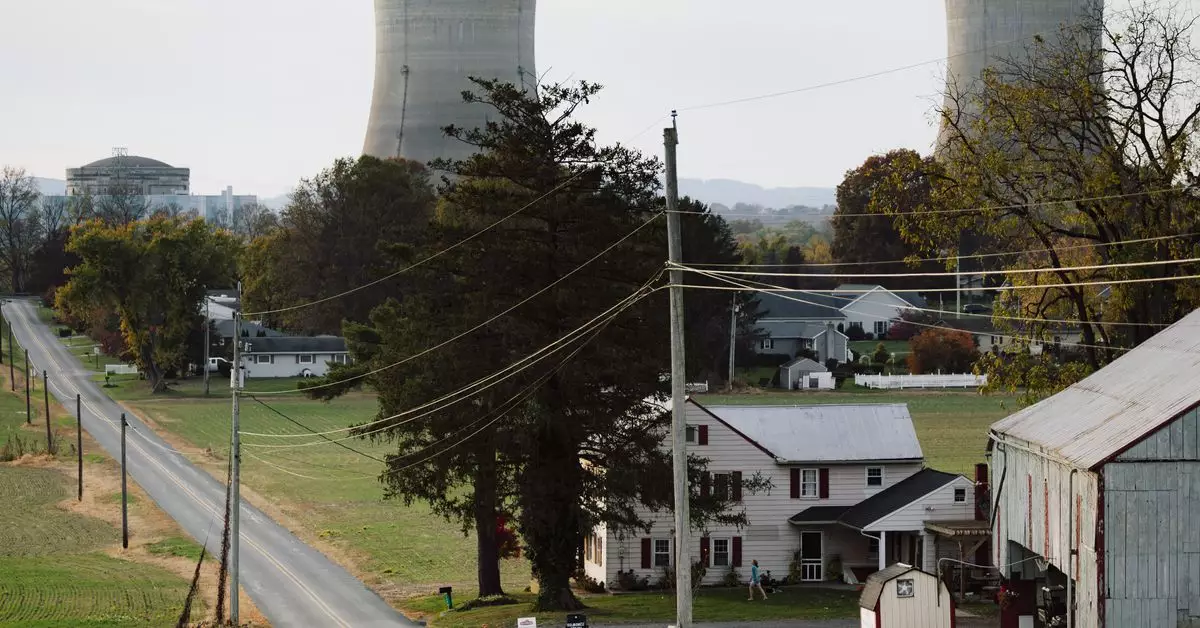In recent years, the narrative surrounding energy consumption and generation has shifted dramatically. At the forefront of this transition is the General Services Administration (GSA), the federal agency tasked with managing government buildings and operations. In a groundbreaking move, the GSA has announced a substantial nuclear energy contract worth $840 million, marking a significant step in embracing cleaner energy alternatives. This contract is emblematic of a growing recognition that nuclear energy can play an essential role in addressing the escalating demand for electricity, particularly from burgeoning industries such as artificial intelligence and data processing.
The 10-year agreement allows the GSA to procure an impressive 10 million megawatt-hours of electricity, enough to power over a million homes annually. Constellation, the recipient of this contract, is recognized as the operator of the largest nuclear fleet in the United States. Already, Constellation has bolstered its position in the sector by collaborating with tech giants like Microsoft to reactivate the historic, yet defunct, Three Mile Island reactor, adding layers of significance to this contract for nuclear energy aficionados.
As technology firms expand their operations to accommodate the vast energy requirements of data centers, nuclear energy is gaining acceptance as a solution. Companies like Microsoft, Google, Meta, and Amazon have recently made considerable investments in nuclear energy initiatives. The GSA’s decision to engage in a long-term agreement with Constellation illustrates a broader trend of corporate and governmental alignment in promoting sustainable energy solutions.
This alignment is particularly noteworthy given the historical resistance to nuclear energy in many corporate sustainability strategies. Joe Dominguez, president and CEO of Constellation, emphasized the transformative nature of this agreement by stating that it showcases the evolving stance towards nuclear energy within both government and corporate sectors. With the U.S. government being the largest energy consumer in the nation, this contract sends a powerful message to industries grappling with increasing energy demands.
The GSA’s procurement agreement is multifaceted, not only focusing on energy generation but also addressing economic stability. By securing a fixed electricity price for the next decade, the GSA is mitigating the risks associated with fluctuating energy costs, particularly in a landscape where energy prices are dictated by various unpredictable factors, including supply chain issues and increased competition for renewable energy sources.
In a world where economic volatility is the new norm, this contract could serve as an essential tool for federal agencies, providing them with predictable energy costs and affording them some protection against the unpredictable energy market. This forward-thinking initiative exemplifies the GSA’s commitment to fostering a reliable energy supply in conjunction with promoting domestic nuclear energy development.
Constellation has made its commitment to sustainability explicit by pledging to achieve 100% carbon-free electricity by 2040. Currently, the company generates around 90% of its energy from non-carbon polluting sources, predominantly nuclear power. This contract holds the potential to not only maintain but expand Constellation’s clean energy generation capability.
Nestled within the broader context of U.S. energy policy, the GSA contract illustrates the federal government’s strategy to transition away from fossil fuels. The current administration is actively pursuing renewable energy sources, with nuclear power being a pivotal element in the energy transition matrix. The recent $1.52 billion loan from the Department of Energy to revive a dormant nuclear power plant serves as an additional indicator of the profound policy shift taking place in Washington.
The GSA’s landmark nuclear energy contract with Constellation symbolizes a significant turning point in the narrative of energy consumption and production in the United States. As the demand for reliable and clean energy sources continues to rise, the inclusion of nuclear energy represents a pragmatic approach to navigating the challenges of climate change and energy security. With growing endorsements from both the private and public sectors, it seems evident that nuclear energy is no longer a sidelined option; it is now emerging as a cornerstone of the quest for a sustainable energy future.
As we stand on the precipice of a new energy era, it’s crucial for stakeholders across industries to recognize the potential of nuclear energy, not only as a viable energy source but also as a critical component in the larger framework of environmental sustainability. The road ahead will undoubtedly be complex, but the GSA-Connetston contract serves as a hopeful beacon for what is possible when innovation, sustainability, and collaboration converge.

